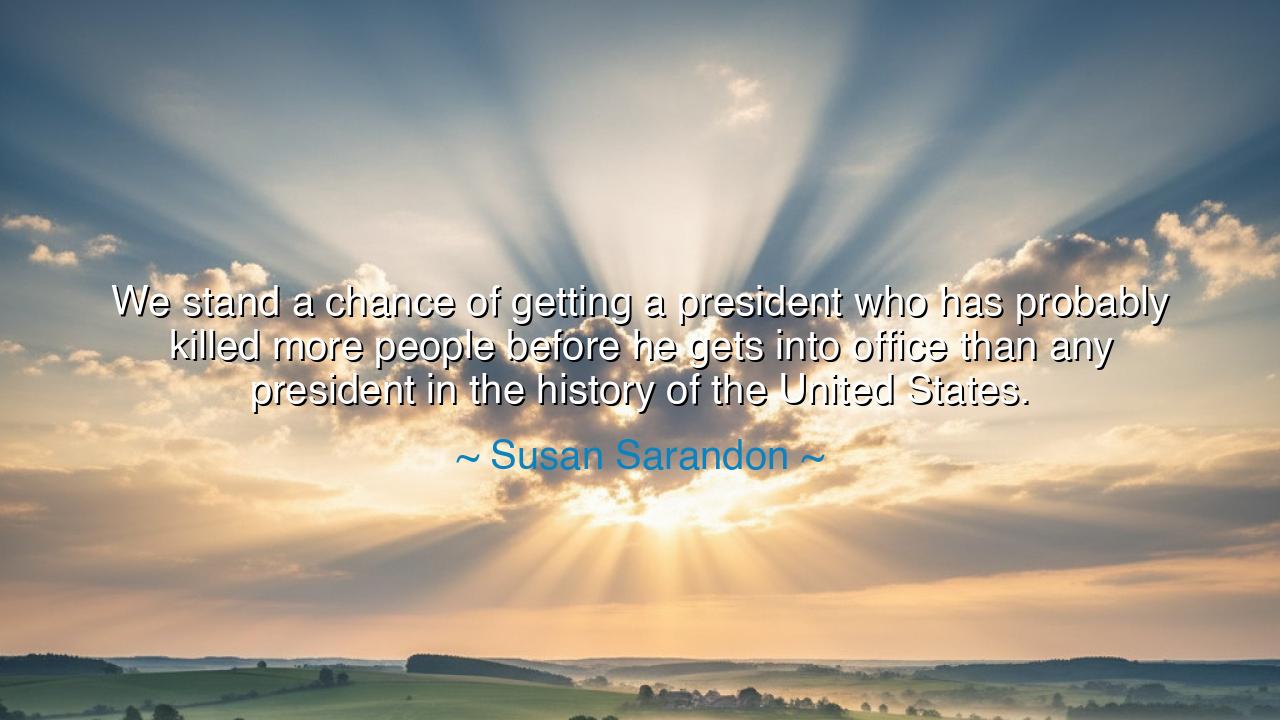
We stand a chance of getting a president who has probably killed
We stand a chance of getting a president who has probably killed more people before he gets into office than any president in the history of the United States.






"We stand a chance of getting a president who has probably killed more people before he gets into office than any president in the history of the United States." These words, spoken by Susan Sarandon, are a stark and unsettling reflection on the heavy burden that comes with political power, and the toll it often takes on both the lives of others and the soul of the individual who wields it. Sarandon’s statement forces us to confront a reality that is often swept under the rug in the pursuit of power: the lives lost, the blood spilled, and the moral compromises made in the name of leadership and progress. It is a call to reflect on the true cost of power—both for those who hold it and those who bear the consequences.
In this proclamation, Sarandon speaks not of rhetoric but of history—of the men who have ascended to the highest office in the land, many of whom have done so on the backs of wars and violence. The truth she expresses is bitter: that the road to the presidency is often paved with the lives of those who have been caught in the gears of military conflict, colonialism, and global geopolitics. This unsettling reality has echoed through time, as countless leaders have risen to power with blood on their hands, their accomplishments built not on peace but on the ashes of war.
Consider, for example, the figure of Alexander the Great, whose conquest of vast swathes of the known world was marked by slaughter and the destruction of entire civilizations. While history lauds his accomplishments, it does so at the expense of the countless lives lost under his reign. Yet, it was this very bloodshed that laid the foundation for the empire that would carry his name through the annals of time. Sarandon’s words remind us that the price of glory and legacy is often measured in the lives of the fallen, and it is in this price that the soul of a leader is forged—and sometimes lost.
Sarandon’s message challenges us to grapple with the moral complexities of leadership. She points to the fact that many who rise to the highest offices do so not through merit or idealism, but through a legacy of violence and destruction. History is replete with examples of leaders who, in their thirst for power, sacrificed the lives of the innocent. Think of Henry Kissinger, whose role in shaping U.S. foreign policy during the Vietnam War and the secret bombings in Cambodia left a trail of devastation. The lives of many were sacrificed in pursuit of political goals, and though his influence was profound, the human cost was staggering. Sarandon’s words echo the unsettling reality that those who govern may have blood on their hands, whether we choose to acknowledge it or not.
Yet, Sarandon does not merely speak in condemnation; she issues a warning—one that is as much about reflection as it is about action. She asks us to consider, deeply, what kind of leaders we are willing to follow, and what kind of leaders we are willing to become. The history of leadership is filled with figures who sought to justify their actions through idealism or the greater good, but the cost of that justification is often felt in the lives of the powerless. Sarandon’s statement calls for a reckoning with the ethics of power, urging us to ask ourselves: what price are we willing to pay for progress, and are we ready to confront the consequences?
In our own time, this lesson is just as vital. We must not allow the hunger for power to obscure our vision of justice and humanity. As individuals, we are often called to stand in the face of difficult decisions, both in our personal lives and in our engagement with the wider world. The cost of action is not always immediate, and the consequences of our choices may echo far beyond what we can perceive. Like Sarandon’s warning, we must be willing to reflect on the consequences of our actions, to question the systems that uphold power, and to demand accountability for the lives that are lost in the pursuit of ambition.
The ultimate lesson here is not simply to criticize those in power, but to question the structures of power itself. It is to challenge the very idea that success or greatness must be built on the blood of others. Sarandon’s words remind us that the true cost of leadership is not always measured in votes or accolades, but in the lives impacted by the choices of those who govern. As we move forward, let us do so with eyes wide open, aware of the moral toll that power exacts, and determined to build a world where leadership is not defined by the blood it demands, but by the peace it nurtures.
Act with awareness, act with compassion, and let us rise to a leadership that does not require the shedding of blood, but the offering of our hearts in service to others. Only then can we begin to heal the wounds left by the ambition of the past and create a future where the pursuit of power is no longer a path marked by destruction, but by the restoration of humanity.






AAdministratorAdministrator
Welcome, honored guests. Please leave a comment, we will respond soon